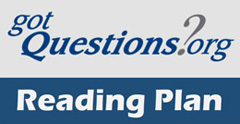THE BIBLE
False Teaching and False Bibles

Many don't like what the Bible has to say, and instead of rejecting it, they alter it. Others read things into the Bible that aren't there. Got Questions investigates false teaching about the Bible and false Scriptures.

Day One: The Bible and the Imposters
The question of which (if any) religious text is the true word of God is of utmost importance. To avoid circular reasoning, the first question we must ask is: how would we know if God communicated in the first place?...
Read More

Day Two: King James Only
Many people have strong and serious objections to the translation methods and textual basis for the new translations and therefore take a strong stance in favor of the King James Version...
Read More

Day Three: The Thomas Jefferson Bible
The Thomas Jefferson Bible, also known as the Jefferson Bible, and officially titled The Life and Morals of Jesus of Nazareth, is a work of Thomas Jefferson, the third President of the United States. Jefferson finished his "Bible" in approximately 1819...
Read More

Day Four: The Queen James Bible
The Queen James Bible (QJV), also called the "Gay Bible," is an edit of the biblical text done in the name of preventing "homophobic interpretations." To accomplish this goal, the publishers printed a Bible in which all negative references to homosexuality have been removed...
Read More

Day Five: The Skeptics' Annotated Bible
The Skeptic's Annotated Bible is a website dedicated to pointing out all of the supposed errors, contradictions, and discrepancies in the Bible...
Read More

Day Six: The Peshitta
The Peshitta is a collection of Aramaic manuscripts of the Bible. Aramaic was the most common "shared language" among people of the Near East and Middle East for many centuries...
Read More

Day Seven: Bibiolatry
The term bibliolatry comes from combining the Greek words for Bible and worship. In a Christian context, simply stated, bibliolatry is the worship of the Bible...
Read More

Day Eight: Bibliomancy
Bibliomancy is the practice of divination by means of a book. Generally speaking, bibliomancy involves turning to a random page in a sacred book in order to find the answer to a question posed...
Read More

Day Nine: Bible Codes
Bible codes are hidden messages purported to exist in the original text of Scripture. Many people claim to have discovered Bible codes using mathematical patterns...
Read More

Day Ten: Biblical Numerology
Biblical numerology is the study of numbers in the Bible. Two of the most commonly repeated numbers in the Bible are 7 and 40. The number 7 signifies completion or perfection (Genesis 7:2-4; Revelation 1:20)...
Read More
comments powered by Disqus
Published 11-11-15

